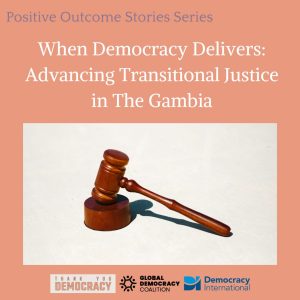Democracy International: When Democracy Delivers: Advancing Transitional Justice in The Gambia

One key challenge for nascent democracies is proving that democracy delivers tangible results. This is particularly a challenge in countries grappling with past atrocities or conflicts, where the key driver behind the desire for democracy is justice.
Following the exile of former dictator Yahya Jammeh in 2017, The Gambia took a crucial step toward healing and justice with the establishment of the Truth, Reconciliation, and Reparations Commission (TRRC) to investigate the Jammeh era from 1994 to 2017. By December 2021, the TRRC had issued its final report, uncovering gross human rights violations and crimes against humanity during Jammeh’s rule. In May 2022, the Ministry of Justice accepted all but two of the TRRC’s 265 recommendations, including establishing a Special Prosecutor’s Office to take possession of the TRRC files and begin formal investigations into the crimes committed. As part of its commitment to addressing the TRRC recommendations, the Ministry of Justice and the Attorney General developed a prosecution strategy in October 2022. However, with the Ministry of Justice facing resource shortages and overwhelming demands, little progress had been made in setting up the necessary prosecution mechanisms by December 2022, leaving citizens frustrated and disappointed at the lack of progress in holding perpetrators accountable.
In April 2023, Democracy International (DI) initiated a rapid response under the USAID-funded Justice, Rights, and Security – Rapid Response Assistance Activity (JRS-RRA). This initiative focused on bolstering The Gambia’s transitional justice process, addressing past human rights abuses, promoting reconciliation, and ensuring accountability for perpetrators. In collaboration with The Carter Center and the Gambian Bar Association, DI provided technical expertise to the Ministry of Justice to draft and socialize legislation to establish mechanisms to bring justice to victims and advance criminal prosecutions in line with international best practice. This included legislation to create a Special Prosecutor’s Office that would take control of files from the TRRC, begin formal investigations, and domestically prosecute lower-level crimes committed, as well as a Special Tribunal to prosecute international crimes absent from domestic criminal law in collaboration with the Economic Community of West African States.
One year later—as a direct result of this work—The Gambia passed the legislation. While much work remains to implement the legislation, DI’s support helped bolster the Gambian government’s capacity to progress on these issues at a key moment. Ultimately, this will enable the Gambian government to respond to citizens’ calls for justice and for democracy to deliver.
